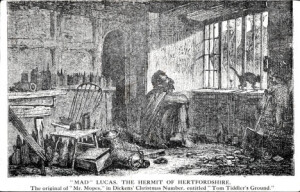( Initially from J. D. Mortimer, An Anthology of the Home Counties 1947), but including commentaries from other sources.
The Hermit of Ickenham ( lived c 1655)
Roger Crabb, an eccentric character, of whom there is a curious account in a very rare pamphlet, entitled ‘The English Hermit, or the Wonder of the Age (1655), lived many years in a cottage at Ickenham, where he subsisted on three farthings a week, his food being bran, mallows, dock leaves, grass and the produce of a small garden; his drink water; for he esteemed it a sin to eat any living creature, or use any other beverage. Towards the latter part of his life he removed to Bethnall Green, where he died in 1680, and was buried at Stepney.
Daniel Lysons, The Environs of London
Actually, Mr Crabb seems to have lived on a rather healthy vegan diet from the age of twenty, when he was a soldier on the parliamentary side during the English Civil War. He later became a haberdasher in Chesham, Bucks and afterwards retired to Ickenham, where he became a pacifist and a proto-Anarchist. He was an anti-Sabbatarian, arguing that Sunday was not a special day. He inveighed against the evils of property, the Church and the Universities. According to one source, he ate potatoes and carrots as part of his vegan diet, but towards the end of his life subsisted mainly on bran, dock leaves (Rumex) and parsnips. Bran is full of vitamins, as are dock leaves, but the latter also contains oxalates, which can induce kidney stones if eaten to excess. All parts of the common mallow are nutritious, however. The leaves can be boiled and made into a soup, and the roots can be candied.
The Frimley Hermit ( 17th century)
At the end of this Hundred, I must not forget my noble friend, Mr Charles Howard’s Cottage of Retirement( which he called his Castle) which lay in the middle of a vast healthy country, far from any Road or Village in the hope of a healthy Mountain, where, in the troublesome times he withdrew from the wicked World, and enjoyed himself here, where he had only one Floor, his little Dining Room, a Kitchen, a Chapel, and a Laboratory. His utensils were all of Wood or Earth; near him were half a Dozen Cottages more, on whom he shew’d much compassion and charity.
John Aubrey: Perambulation of Surrey
Continue reading

